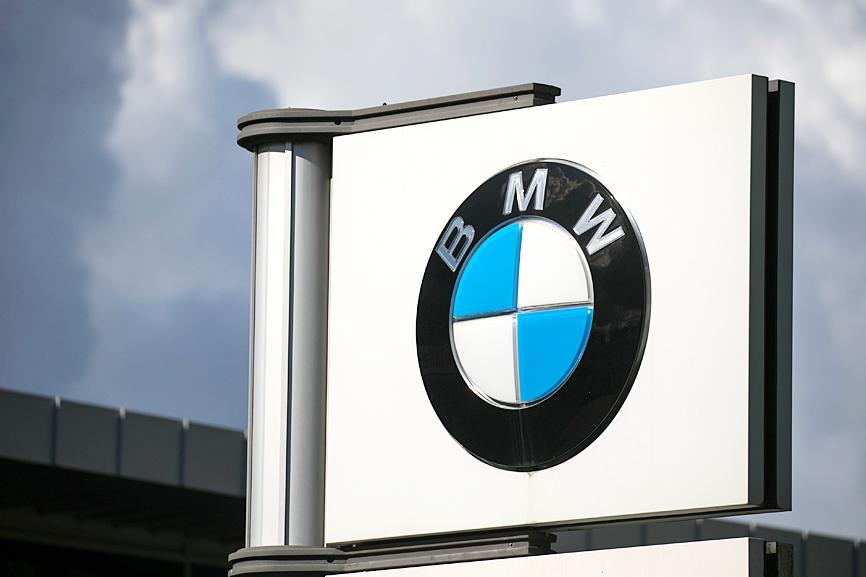BMW AG yesterday joined peers with strong earnings dampened by warnings of tense months ahead because of a global chip shortage that is roiling vehicle output.
Earnings before interest and tax surged to 5 billion euros (US$5.9 billion) in the second quarter, compared with an average analyst estimate of 4 billion euros.
The operating return from making vehicles jumped to 16 percent, roughly double the automaker’s annual forecast of 7 to 9 percent.

Photo: Bloomberg
“The longer the supply bottlenecks last, the more tense the situation is likely to become,” BMW chief financial officer Nicolas Peter said in a statement. “We expect production restrictions to continue in the second half of the year and hence a corresponding impact on sales volumes.”
The manufacturer’s expectations mirror concerns among elsewhere.
As Volkswagen AG lifted its operating returns forecast, helped by its luxury Audi and Porsche brands, it warned of worsening supply woes, while Daimler AG has dialed back its delivery expectations due to the shortage.
BMW, while not immune, had fared better than others and has reported only minor disruptions at its factories so far.
The Munich-based automaker also profited from higher prices and giving priority to making its most lucrative models at constrained factories.
The dynamic has helped take the sting out of rising raw material prices, although BMW said that the gains will drag on earnings during the remainder of the year.
As BMW joined automakers in hesitating to make earnings upgrades after a strong first half, Stellantis NV, also reporting earnings yesterday, substantially raised its full-year profitability forecast.
With its Ram and Jeep brands, the company is heavily exposed to the US market, which has had a “breathtaking” rise in prices.
Adjusted operating income margin will be about 10 percent for the year, the automaker formed from the merger between Fiat Chrysler Automobiles NV and PSA Group said.
Stellantis notched an 11.4 percent return in the first six months, more than double the low end of the range forecast in March.
The semiconductor shortage cost the company output of about 700,000 vehicles in the first half, Stellantis said, adding that the impact will be similar for the remainder of the year.
“It was a very strong quarter,” Stellantis chief financial officer Richard Palmer said on a call with reporters.
The company expects the chip situation in the third quarter to be roughly in line with the prior three months — when output was crimped by 500,000 units — and potentially improve toward the end of the year.

Semiconductor business between Taiwan and the US is a “win-win” model for both sides given the high level of complementarity, the government said yesterday responding to tariff threats from US President Donald Trump. Home to the world’s largest contract chipmaker, Taiwan Semiconductor Manufacturing Co (TSMC, 台積電), Taiwan is a key link in the global technology supply chain for companies such as Apple Inc and Nvidia Corp. Trump said on Monday he plans to impose tariffs on imported chips, pharmaceuticals and steel in an effort to get the producers to make them in the US. “Taiwan and the US semiconductor and other technology industries

CHIP WAR: Tariffs on Taiwanese chips would prompt companies to move their factories, but not necessarily to the US, unleashing a ‘global cross-sector tariff war’ US President Donald Trump would “shoot himself in the foot” if he follows through on his recent pledge to impose higher tariffs on Taiwanese and other foreign semiconductors entering the US, analysts said. Trump’s plans to raise tariffs on chips manufactured in Taiwan to as high as 100 percent would backfire, macroeconomist Henry Wu (吳嘉隆) said. He would “shoot himself in the foot,” Wu said on Saturday, as such economic measures would lead Taiwanese chip suppliers to pass on additional costs to their US clients and consumers, and ultimately cause another wave of inflation. Trump has claimed that Taiwan took up to

A start-up in Mexico is trying to help get a handle on one coastal city’s plastic waste problem by converting it into gasoline, diesel and other fuels. With less than 10 percent of the world’s plastics being recycled, Petgas’ idea is that rather than letting discarded plastic become waste, it can become productive again as fuel. Petgas developed a machine in the port city of Boca del Rio that uses pyrolysis, a thermodynamic process that heats plastics in the absence of oxygen, breaking it down to produce gasoline, diesel, kerosene, paraffin and coke. Petgas chief technology officer Carlos Parraguirre Diaz said that in

Japan intends to closely monitor the impact on its currency of US President Donald Trump’s new tariffs and is worried about the international fallout from the trade imposts, Japanese Minister of Finance Katsunobu Kato said. “We need to carefully see how the exchange rate and other factors will be affected and what form US monetary policy will take in the future,” Kato said yesterday in an interview with Fuji Television. Japan is very concerned about how the tariffs might impact the global economy, he added. Kato spoke as nations and firms brace for potential repercussions after Trump unleashed the first salvo of